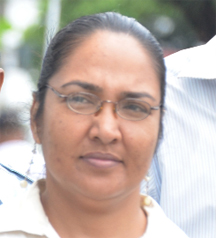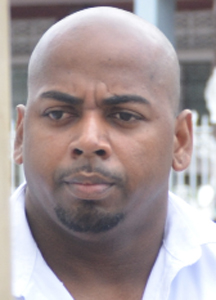The lawyers for Jarvis Small and Bibi Sharima-Gopaul, the couple on trial for the murder of 16-year-old Neesa Gopaul, yesterday asked jurors to find their clients not guilty, while charging that there was a lack of evidence to convict them.
Small, and Sharima-Gopaul, the mother of the murdered teen, are accused of killing the young girl between September 24, 2010, and October 2, 2010, at Madewini, Linden-Soesdyke Highway. The teen’s body was found stuffed into a suitcase, which was anchored in a creek at the Emerald Tower Resort with several dumbbells.
The accused are on trial before Justice Navindra Singh and a 12-member jury.

In his submissions to the court, attorney Lyndon Amsterdam, one of Small’s four lawyers, argued forcefully that the prosecution has failed to substantiate three aspects of the indictment.
He said it has been unable to say that it was Neesa Gopaul who had died, that she died between September 24, 2010, and October 2, 2010; and that it is the accused who are responsible; whether individually or collectively, for the death.
Amsterdam told the jurors they might find it ridiculous if he were to say that he knows of no evidence against his client. But he said that while items had been properly tendered and admitted into evidence according to law, he had been left with more questions than answers and was confused.
The attorney also questioned the credibility of the state witnesses, saying he found it difficult to elevate their stories to the status of evidence against his client in light of the inconsistencies.
Counsel reminded the jury that it must bear in mind that the prosecution has to prove its case beyond reasonable doubt and that if there is any hint of doubt, his client should be found not guilty.
In submissions, which lasted more than two hours, Amsterdam said that in preparing his submissions, he put the heading “evidence against the number one” on a page but it remains blank because he found no such evidence.

He advanced that the only piece of seeming evidence which the police claim to have against his client is Superintendent of Police Hugh Jessemy’s testimony that Small told investigators he did not murder Neesa Gopaul, but knew who did.
Counsel, however, argued that even this does not amount to evidence of guilt and pointed out that there is a clear and unequivocal statement where his client is reported to have told the police that he did not kill the teen.
Several police witnesses, including Jessemy and Detective Assistant Superintendent Mitchell Ceasar had testified that Small had told them during an interview that he did not murder the teen but knew who did and that if he were to reveal that information, the investigation would turn in the “correct direction.”
The lawyer questioned rhetorically whether, because a person may know who killed another that it follows that the person with such knowledge is to be convicted for murder. He reminded the jury also that police

witnesses had testified that at the time the accused were charged there was no evidence against them.
Amsterdam bashed the police, questioning the level and substance of their investigation for not having an unbiased and open-minded approach to the way they investigated the matter.
A furious Amsterdam questioned why the police had not gone to the young girl’s school or interviewed her neighbours or persons around the area the body was found. He also questioned why the police did not check the young girl’s cellphone or computer for possible clues.
“Do these things only happen in the developed countries or on CSI or in the movies?” he asked.
Counsel said the trial saw witnesses who, under cross-examination, either could not recall things or noted that they had made mistakes when certain things were said in their evidence-in-chief.
According to him, because of the inconsistencies in the state’s case, the jurors would have to play “abna-babna” when they enter the jury room to deliberate to arrive at the verdict.
Looking at the jury, Amsterdam questioned: “Do you have evidence at the end of the day that makes you feel sure that you can convict the number one for murder?”
Acknowledging that it is tragic that a person had died, Amsterdam said it is important that he keeps his emotions divorced from executing his job and admonished the jury to do the same. “The case must be determined on the evidence or lack thereof,” he cautioned.
The lawyer said unlike the witnesses who testified, he has every confidence in the jury that it will execute its duty efficiently.
Meanwhile, in his address to the court, Sharima -Gopaul’s attorney, George Thomas, also reminded the jury that when it comes to making its decision, it must be sure beyond reasonable doubt, that his client committed the offence.
Thomas said the items which the police said were found at the scene had not undergone any analysis to determine that they belonged to his client, who has said that they are not hers.
Responding to the testimony given by Simone De Nobrega, Thomas said that there are inconsistencies in the story which she claimed his client had related to her.
De Nobrega had testified that Sharima-Gopaul had confided in her that it was not she, but her lover and now co-accused, Small, who murdered her daughter by bashing her head in with a piece of wood.
In unsworn testimony from the prisoners’ dock in her own defence on Tuesday, however, the accused said at no time did she ever have a discussion with De Nobrega in which she made any confessions to her.
Thomas advanced that De Nobrega’s deceptive character must be properly analysed by the jury as it determines the credibility of her story, considering that she had been tried and convicted for an offence associated with deception.
De Nobrega had surrendered to police on Thursday last before taking the witness stand as she had been previously convicted in a lower court and sentenced to five years in her absence for the charge of obtaining credit by false pretense.
Thomas noted that he was not insinuating that a person convicted for such an offence cannot relate an honest story, but that it is an issue which must be carefully examined.
Thomas questioned the plausibility of De Nobrega’s story about his client colluding with Small to poison her husband, who died in 2009, when she, [De Nobrega] had also testified that Sharima-Gopaul told her she met Small in August of 2010.
“How could they plan to poison a dead man?” Thomas asked.
Refuting De Nobrega’s testimony that his client told her of taking the vehicle to a wash bay to be thoroughly cleaned after Neesa’s body had been placed inside, Thomas reminded the jury to consider that Superintendent Stephen Greaves of the Police Forensic Lab had testified of processing the vehicle in which nothing of evidential value had been found. The lawyer also questioned the reason the police did not visit the wash bay to interview persons who may have been able to provide information.
He said that in the absence of De Nobrega’s inconsistent testimony, the prosecution has failed to prove who caused the young girl’s death and where, how when it occurred.
“I therefore urge you to return a verdict of not guilty,” the attorney said.
The case continues this morning when State Prosecutor Diana Kaulesar will present closing arguments in response to the addresses made by the defence.
Meanwhile, the prosecution had signaled its intention on Monday to respond to the reason Sharima-Gopaul had given in her defence about why the Child Care and Protection Agency had ordered that her daughters Neesa and Merriam be placed in the custody of their maternal grandparents.
Kaulesar, however, withdrew that application yesterday.
Justice Singh announced that he will sum-up and give directions to the jury tomorrow, after which he will hand the case over to them for deliberation and the return of a verdict.





